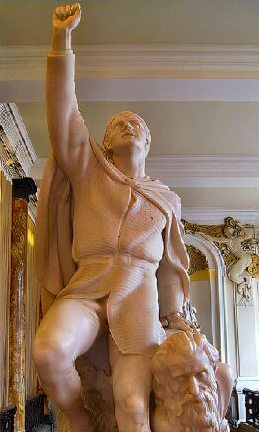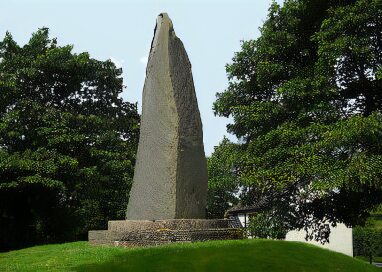Circa. 1223 - 11 December 1282
Llywelyn ap Gruffydd was the last prince of an independent Wales before its conquest by the English. Llywelyn, who was born around 1223 was the son Gruffydd ap Llywelyn, himself the son of Llywelyn the Great, and Senena ferch Rhodri.
Statue of Llywelyn the Last at Cardiff City Hall
Following the death of Llywelyn the Great in 1240, he was succeeded as Prince of Gwynedd by Dafydd ap Llywelyn, his son by his marriage to Joan, the daughter of King John of England. Llywelyn's father Gruffydd, who was the son of Llywelyn the Great and his mistress Tangwystl, the daughter of Llywarch Goch of Rhos, refused to submit to the rule of his half-brother Dafydd and was imprisoned in Criccieth Castle for 11 months, he was given over to the custody of Henry III of England. Gruffydd perished in 1244, from a fall when a makeshift rope gave way while he was attempting a daring escape from the Tower of London. Gruffydd's body was later returned to Wales and was buried at Aberconwy Abbey. When war broke out between Dafydd of Gwynedd and King Henry III in 1245, the young Llywelyn supported his uncle.
Llywelyn, who succeeded his uncle as Prince of Gwynedd at the age of eighteen, ruled for 36 years, from 1246 to 1282. In 1247, a year after the death of Dafydd, the Treaty of Woodstock was concluded with Henry III, under its terms, Gwynedd lost all the lands to the east of the River Conwy. At the Battle of Bryn Derwin in 1255, Llywelyn defeated his rebellious brothers Owain and Dafydd and imprisoned them, Dafydd was released after a few months but Owain remained his brother's prisoner for 22 years. Llywelyn began to reassert the authority of Gwynedd, by 1267 Henry III accepted him as overlord of Wales in the Treaty of Montgomery. Gruffydd ap Gwenwynwyn prince of Powys and Llywelyn's brother Dafydd tried to assassinate him in 1274, the attempt failed and they fled to seek refuge at the court of the new king of England, Henry's son, Edward I. Llywelyn refused to attend Edward's coronation on the grounds that Edward was harbouring his enemy.

The Welsh prince later reneged on the terms of the Treaty of Montgomery and refused to render homage to Edward I or make the promised payments. He further enraged Edward by contracting a proxy marriage in 1275 to Eleanor de Montfort, the daughter of the rebel Simon de Montfort, 6th Earl of Leicester and his wife Eleanor Plantagenet, who was Henry III's sister. When Eleanor set sail from France to Wales, Edward had her ship seized and imprisoned at Windsor Castle for three years.
Llywelyn strengthened and fortified his grandfather, Llywelyn the Great's castles at Criccieth, Ewloe, and Dolwyddelan and in 1273 he commenced the building of a new castle at Dolforwyn, above the Severn valley, which offered a challenge to Edward's frontier post at Montgomery. Determined to limit Llywelyn's growing power in Wales, Edward gathered troops at Chester and Montgomery and launched an invasion. In April 1277 Dolforwyn Castle was taken by the English and was quickly followed by Beullt in May. The Pope placed Wales under interdict and excommunicated Llywelyn. Soon Rhuddlan had also fallen to Edward's forces. The English landed on Anglesey, harvesting the crops which were intended to feed the Welsh through the winter. Llywelyn was forced to hide in the mountains of Snowdonia but in October requested terms with Edward. The resulting Treaty of Aberconwy represented a humiliating defeat for Llywelyn. Stripped of the overlordship he had acquired ten years previously, Gwynedd was again reduced to the area to the west of the River Conwy. He travelled to Edward's court at Christmas 1277, where he was allowed to marry Eleanor de Montfort in 1278.
Llywelyn's brother Dafydd attacked Hawarden Castle on 21 March 1282, he then laid siege to Rhuddlan, which led to war with Edward. Llywelyn, who had not initially been involved in the revolt, nevertheless felt obliged to side with his brother and led the Welsh resistance against a further English invasion. Tragedy struck on 19 June 1282, when his wife Eleanor died soon after giving birth to a daughter Gwenllian at Abergwyngregyn.
The English led a force from Anglesey across a newly completed pontoon bridge, as they reached the mainland they were attacked by the Welsh. The English fled back over the bridge as it began to collapse due to sabotage by the Welsh, resulting in the death by drowning of hundreds of English soldiers. The Archbishop of Canterbury attempted to mediate, Llywelyn was offered an earldom and estates in England if he would surrender Wales to Edward, while Dafydd was to go on crusade. Llywelyn proudly replied he would not abandon the people whom his ancestors had protected since 'the days of Kamber son of Brutus' and declined Edward's offer.
Memorial Stone to Llywelyn the Last at Cilmeri
Llywelyn attempted to rally support in mid and south Wales, leaving Dafydd to undertake the defence of Gwynedd. At the Battle of Orewin Bridge fought on 11 December at Builth Wells, he was slain while separated from his army. Two conflicting accounts of his death exist, while both agree that Llywelyn was deceived into leaving the bulk of his army and was then attacked and killed, they differ in detail. The first account states that Llywelyn and his chief minister approached the forces of Edmund Mortimer, Earl of March and Hugh Le Strange after crossing a bridge. They were alerted by the sound of battle as the main body of his army met the forces of Roger Despenser and Gruffudd ap Gwenwynwyn. Llywelyn turned to rejoin his army and was pursued by a lone lancer who is said to have struck him down. His body was later said to have been recognised by a knight.
The alternative version of the events leading to his death was written down by monks in contact with Llywelyn's daughter, Gwenllian ferch Llywelyn, and his niece, Gwladys ferch Dafydd. This version states that Llywelyn, at the forefront of his army, approached the combined forces of Edmund and Roger Mortimer, Hugo Le Strange and Gruffudd ap Gwenwynwyn under the impression that he would receive their homage. His army was engaged in a fierce battle during which a significant section of it was routed, causing Llywelyn and some eighteen retainers to become separated from the rest. As dusk fell, Llywelyn and his small group of followers were ambushed and pursued into the woods at Aberedw, where Llywelyn was surrounded and struck down. As he lay dying, he asked for a priest to whom he revealed his identity. He was then killed and his head struck from his body. His body was searched and his privy seal taken, his head was was sent to Edward at Rhuddlan, who sent it onto London to be displayed on a pike over the gate to the Tower of London. The burial place of Llywelyn's body is not known with certainty, but tradition states that it was interred at the Cistercian Abbey of Cwm Hir. A stone monument at the village of Cilmeri inscribed Llywelyn Ein Llyw Olaf ('Llywelyn, Our Last Leader') today marks the spot where Llywelyn, the last native Prince of Wales fell.
Llywelyn's brother Dafydd assumed guardianship of his orphaned daughter Gwenllian and continued fighting the English for several more months. On 21 June 1283, he was taken prisoner by the English, along with his family at a secret hiding place in a bog by Bera Mawr in the uplands of North Wales. Dafydd, who was severely wounded, was taken to Rhuddlan, then removed under guard to Shrewsbury, where he was later hung, drawn, and quartered. Edward appropriated the historic, religious and regal artefacts of Gwynedd and annexed Wales to the English crown.
The six-month-old Gwenllian and her cousins, Dafydd ap Gruffudd's daughters were all imprisoned for life by her cousin Edward I. Gwenllian was placed in a remote Priory at Sempringham where she was held captive until her death fifty-four years later.
Dafydd ap Llywelyn PreviousNext Owain Glyndwr
